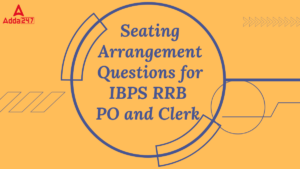Reasoning is a game of wits and presence of mind! Yes, it is true and it might seem as the greatest of the challenge after English Section’s surprises but yet this one can easily be dealt with. You just need correct practice and hardwire your brain to quickly make decisions of what to attempt and what to leave. Practice with these twisted one reasoning question for RBI Grade-B Phase-1 Exam.
Directions (1-5) : Study the following information carefully and answer the questions which follow–
Mr. X, who lives in Bihar has five sons i.e. A, B, C, D and E and they are working in five different organizations-Google, Bank of America, HSBC Holdings, Bank of China and NetApp but not necessary in that order. Mr. Y who lives in Punjab has five daughters i.e. P, Q, R, S and T and they are working in five different organizations-Barclays, Microsoft, Goldman Sachs, Deutsche Bank and Cisco but not necessary in that order. These five boys are married to these five girls but not necessary in given order.
S is either working in Barclays or Cisco but does not married to one who works in Bank of America. A does not work in Bank of America or Google but married to one who works in Cisco. The one who works in Goldman Sachs is married to E who does not work in Google and Bank of America.
The boy who works in Google is either married to S or T. E is not married to P, who works either in Goldman Sachs or Deutsche Bank. A is working in Netapp and married to S. D does not work in HSBC Holdings or Bank of America but married to one who works in Microsoft.
C is married to R but does not work with NetApp or Bank of America. R does not married to one who works in Bank of America. Q is married to one who works in HSBC Holdings.
Q1.Who is married to T?
(a) A
(b) B
(c) C
(d) D
Q2.Who is employee of Bank of China?
(a) A
(b) B
(c) C
(d) D
(e) E
Q3.In which of the following bank the wife of E is working?
(a) Goldman Sachs
(b) Cisco
(c) Barclays
(d) Microsoft
(e) Deutsche Bank
Q4.Who works with Microsoft?
(a) Wife of C
(b) P
(c) Q
(d) T
(e) Wife of one who works in Bank of America
Q5.Who is married to one who works with NetApp?
(a) The one who works with Deutsche Bank
(b) The one who works with Barclays
(c) The one who works with Goldman Sachs
(d) The one who works with Cisco
(e) Cannot be determined
Directions (6-10): Each of the questions below consists of a question and three statements numbered I, II and III given below it. You have to decide whether the data provided in the statements are sufficient to answer the question. Read all the three statements and Give answer
(a) if the data in Statement I and II are sufficient to answer the question, while the data in Statement III are not required to answer the question.
(b) if the data in Statement I and III are sufficient to answer the question, while the data in Statement II are not required to answer the question.
(c) if the data in Statement II and III are sufficient to answer the question, while the data in Statement I are not required to answer the question.
(d) if the data in Statement I alone or in Statement II alone or in Statement III alone are sufficient to answer the question.
(e) If the data in all the Statements I, II and III together are necessary to answer the question.
Q6.Among six people P, Q, R, S, T and V, each lives on a different floor of a six-storey building having its six floors numbered one to six (the ground floor is numbered 1, the floor above it, number 2, and so on, and the topmost floor is numbered 6). Who lives on the topmost floor?
I. There is only one floor between the floors on which R and Q live.
II. T does not live on an even-numbered floor. Q lives on an even-numbered floor. Q does not live on the topmost floor.
III. S lives on an odd-numbered floor. There are two floors between the floors on which S and P live. T lives on a floor immediately above R’s floor.
Q7. There are six letters W, A, R, S, N and E. Is ‘ANSWER’ the word formed after performing the following operations using these six letters only?
I. E is placed fourth to the right of A. S is not placed immediately next to either A or E.
II. R is placed immediately next (either left or right) to E. W is placed immediately next (either left or right) to S.
III. Both N and W are placed immediately next to S. The word does not begins with R. A is not placed immediately next to W.
Q8.Point D is in which direction with respect to Point B?
I. Point A is to the west of Point B. Point C is to the north of Point B. Point D is to the south of Point C.
II. Point G is to the south of Point D. Point G is 4m from Point B. Point D is 9m from Point B.
III. Point A is to the west of Point B. Point B is exactly midway between Point A and E. Point F is to the south of Point E. Point D is to the west of Point F.
Q9.How is ‘one’ coded in a coded language?
I. ‘one of its kind, is coded as ‘zo pi ko fe’ and ‘in kind and cash’ is coded as ‘ga to ru ko’.
II. ‘its point for origin’ is coded as ‘ba le fe mi’ and ‘make a point clear’ is coded as ‘yu si mi de’.
III. ‘make money and cash’ is coded as ‘to mi ru hy’ and ‘money of various kind’ is coded as ‘qu ko zo hy’.
Q10.Are all the four friends, viz A, B, C and D, who are sitting around a circular table, facing the centre?
I. B sits second to the right of D. D faces the centre. C sits on the immediate right of both B and D.
II. A sits on the immediate left of B. C is not an immediate neighbour of A. C sits on the immediate right of D.
III. D is an immediate neighbour of both A and C. B sits on the immediate left of A. C sits on the immediate right of B.
Directions (11-15): Study the information and answer the following questions:
In a certain code language
“began his fast at” is coded as “Z#25 R#19 H@21 Z@26”
“the bumper crop production ” is coded as “S#7 V@25 L@24 L@11”
“stir turned violent against” is coded as”R@8 V@7 M#5 H#26″
Q11.What is the code for ‘left’ in the given code language?
(a) U@15
(b) U@25
(c) V@15
(d) X@15
(e)None of these
Q12.What is the code for ‘quality’ in the given code language?
(a) G#10
(b) G#15
(c) H#10
(d) G@10
(e)None of these
Q13.What may be the possible code for ‘demanding’ in the given code language?
(a) N#23
(b) M#23
(c) M#24
(d) M@23
(e)None of these
Q14.What may be the possible code for ‘including’ in the given code language?
(a) M#19
(b) M#18
(c) M@18
(d) N#18
(e)None of these
Q15.What is the code for ‘agriculture’ in the given code language?
(a) I#36
(b) H#26
(c) I#26
(d) M#26




 GA Capsule for SBI Clerk Mains 2025, Dow...
GA Capsule for SBI Clerk Mains 2025, Dow...
 The Hindu Review October 2022: Download ...
The Hindu Review October 2022: Download ...
 Seating Arrangement Questions for IBPS R...
Seating Arrangement Questions for IBPS R...





